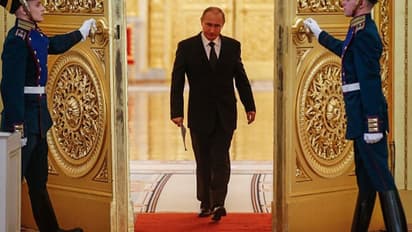Russia's Vladimir Putin held a 3.5 hour yearend media briefing

Synopsis
Due to Covid-19 restrictions, media outlets could not seek for accreditation for the first time since the event's debut in 2001; instead, the Kremlin hand-picked 500 foreign and domestic journalists to participate.
Russian President Vladimir Putin conducted his customary end-of-year news conference in Moscow on Thursday, as rising tensions with the West over Ukraine fueled concerns of a full-fledged conflict. Due to Covid-19 restrictions, media outlets could not seek for accreditation for the first time since the event's debut in 2001; instead, the Kremlin hand-picked 500 foreign and domestic journalists to participate. In addition to the Ukraine conflict, journalists grilled Putin on issues ranging from Russia's assault on civil society and the economic impact of the coronavirus outbreak.
Spoke about country's economy
The first few press conference questions focused on Russia's economy, which has rebounded to pre-coronavirus levels but has stagnated in recent months. Putin stated that Russia had recovered better from the epidemic than many industrialised nations, gave a variety of economic figures, and predicted that real earnings, which are roughly 10% lower than they were in 2013, will climb by 3.5 percent this year. However, he identified rising inflation and the country's demographic condition as serious economic difficulties. Inflation is presently at a six-year high of 8.4 percent, and he claims Russian business leaders complain to him every day about the Central Bank's high interest rates imposed to contain the pricing crisis. He did, however, support the Central Bank's policy and independence.
Concerning Ukraine-related tensions with the West
Several questions focused on the situation in Ukraine, with Putin blaming Kiev and its Western supporters for the current spike in tensions and asking that the West provide Russia with security assurances "right now." He did, however, express confidence about negotiations with Washington on Moscow's proposed security guarantees, which seek to keep NATO out of most of the post-Soviet world. He described the present talks with the U.S. as "promising" and hinted at further direct talks in Geneva in the new year, adding, "The ball is in their court." The West accuses Russia of orchestrating an invasion of Ukraine, which has been fighting pro-Moscow rebels in its eastern Donbass area since 2014.
When asked about the situation in Ukraine and if a conflict was possible, Putin stated that Russia was reacting to Kiev's threats. In answer to a question concerning Moscow's tensions with the West, Putin stated that his country's actions would be based on the "unconditional supply of Russia's security," rather than conversations with the U.S. on his proposed security assurances.
Spoke about Navalny's poisoning and other issues
Putin encouraged Western nations to "turn the page" on the poisoning of imprisoned Kremlin opponent Alexei Navalny and asked civic society for assistance in probing torture incidents in Russian jails. He stated, without providing evidence, that Western countries had failed to give proof of Navalny's poisoning with the Novichok nerve toxin in Siberia in August 2020. Putin said Navalny serves "foreign interests," comparing him to those who "destroyed" the Russian Empire and the Soviet Union "from within," and accused the activist of using politics as a "shield" from his criminal conviction.
Navalny returned to Russia in early 2021 and was sentenced to 2.5 years in jail for breaking parole while in rehabilitation abroad. Putin also addressed the high-profile video releases of alleged rape and torture inside Russia's jail system this year, which gained widespread attention. Following claims that jail torture occurs in the United States and France, Putin stated that Russian officials had initiated 17 criminal cases in response to the torture disclosures.
On Russia's foreign policy
In addition to a slew of local reporters, Putin fielded questions from British, Italian, Kazakh, Chinese, and Belarusian newsgroups. In response to the last three questions, he emphasised Russia's strong, friendly economic and cultural ties with their respective nations. Putin told an Italian reporter that, despite Italy's participation in NATO and the EU, he hoped for continued collaboration with the nation in various areas. Meanwhile, Putin attacked a Sky News reporter for the West's aggressive foreign policy toward Russia.
When questioned about Russia's relations with the new Taliban leadership in Afghanistan, he did not specify whether Russia would recognise the new government in Kabul. Still, he expressed hope for the country's stability and cautioned against radicals infiltrating neighbouring Central Asian nations. He also asked the West to release Afghanistan's frozen assets, alleging that the country is on the cusp of a massive humanitarian calamity.
Also Read | Taliban appreciates Vladimir Putin's statement to remove them from terrorists' list
Addressed COVID issue
The coronavirus was a persistent presence during the news conference, as the second year of the epidemic came to a conclusion, and Russia's excess death toll was among the highest in the world. Putin decried Russia's low vaccination coverage, which is now about 45 percent of people following a year-long vaccine programme, and blamed it on the country's Covid-19 mortality rate, one of the highest globally.
According to polls, a continuous, if declining, most Russians are sceptical about the vaccine and do not intend to inoculate themselves. On the other hand, Putin reaffirmed his long-standing opposition to vaccination mandates, stating that people who refuse to vaccinate should be handled "respectfully" and the problem "explained" to them.
Also Read | Vladimir Putin 'totally well', in self-isolation after COVID cases detected in inner circle: Kremlin
Check the Breaking News Today and Latest News from across India and around the world. Stay updated with the latest World News and global developments from politics to economy and current affairs. Get in-depth coverage of China News, Europe News, Pakistan News, and South Asia News, along with top headlines from the UK and US. Follow expert analysis, international trends, and breaking updates from around the globe. Download the Asianet News Official App from the Android Play Store and iPhone App Store for accurate and timely news updates anytime, anywhere.